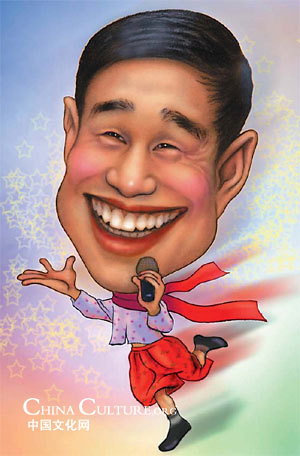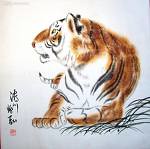| Home > Living in China > Art |
Funny...ha-ha or peculiar?
 |
Every culture has its own sense of humor. That's why Jim Carrey in The Mask might not make all Chinese people laugh, but a piece of crosstalk can. The Chinese do humor in several forms: xiangsheng (crosstalk) was the most popular, then came xiaopin (comic skit), and now errenzhuan (two-person sketch).
Crosstalk, known in China as the "art of laughter", is a traditional art form between two performers satirizing society and its people through funny stories. Although a good crosstalk performer is said to be "earning a living by talking", it is not the case in the West.
Chinese most popular comic Xiao Shenyang became a huge hit thanks to his performance at the Spring Festival Gala show. Zhu Zizun
English entertainment journalist David Drakeford, who has lived in Beijing for five years and has learnt a little bit of this art, finds it is interesting because the jokes are all about ordinary people.
"I heard one skit that went like this: A says 'I work at a famous English school. B asks him 'Are you a teacher there?' A replies 'I only open the door for others.' This common joke between two ordinary people is very funny. Of course they are professional comedians so the timing is important," Drakeford says.
He likens Chinese crosstalk to the Western tradition of a comedy duo and requires four skills of its performers: speaking, mimicking, teasing and singing. "Chinese humor uses slaptick and wordplay," says Drakeford. "Western humor is probably more political, more satirical and sometimes kind of nasty,"
Xiao Shenyang made a name for himself after he performed a comic skit Enough Money for CCTV's 2009 Spring Festival Gala. His skit took some jokes and performing styles from errenzhuan, a Northeastern art form, which involves storytelling, singing and dancing between two performers, and is considered grassroots because it is rich in local style.
Before Xiao Shenyang appeared at the Gala, he had already introduced errenzhuan to parts of China, performing on provincial TV variety shows. His first routine had a funny man being teased mercilessly by a plump woman. In Beijing TV's gala, he appeared in a black suit but carrying a women's bag and speaking with an effeminate voice. During the show, he demonstrated his skills in singing, dancing, telling jokes and communicating with other actors.
The very popular Xiao Shenyang has boosted awareness of errenzhuan thanks to his authentic Northeastern accent and acting skills.
Rynn Chaw, a crosstalk fan from Hong Kong, saw Xiao Shenyang as great fun. "Maybe other people find errenzhuan to be a little bit tasteless, low and dirty but I don't think humor is serious. It is not serious in any culture," says Chaw, who believes that the Chinese way of presenting humor is a work in progress.
"The Chinese attitude to humor is that it does not have to pretend to be 'fake' or 'elegant'. That might be why Xiao Shenyang and errenzhuan have become popular," Chaw says.
Instead of finding humor in 'tasteless' jokes, Westerners have their own way of getting a laugh. "American Jews are famous for comedy - The Marx Brothers, Woody Allen, Larry David all use self-deprecation, so they are joking at themselves, their families and all Jews," Drakeford says. He notices, however, that "Chinese never joke about China".
Chaw finds Chinese versions of stage comedy are similar to each other. "Compared with Westerners, Chinese people are likely to be more reserved and indirect, no matter whether it is a comic skit, a piece of crosstalk or errenzhuan," he says.
The result, says Chaw, is that when you hear a Western joke, you might laugh instantly but when you hear one in a Chinese crosstalk or comic skit it might take three or four seconds.
Art
 more
moreFunny...ha-ha or peculiar?
Every culture has its own sense of humor.

Let your fingers do
In Peking Opera, finger movements express different

Crouching tigers in small viliage
In Chinese culture, tiger is an auspicious and sacred

Customs
 more
more



 print
print  email
email  Favorite
Favorite  Transtlate
Transtlate 
